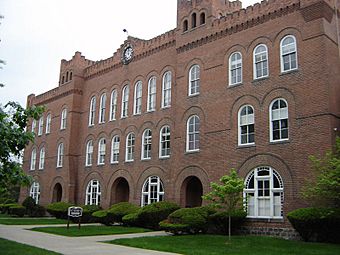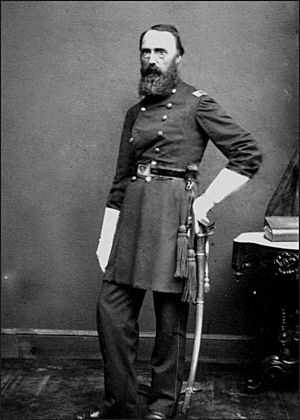Michigan Military Academy facts for kids
Quick facts for kids |
|
|
Orchard Lake Schools Historic District
|
|

The Academic Building of the Michigan Military Academy was built in 1890. It now holds many of the classrooms for St. Mary's Preparatory.
|
|
| Location | Indian Trail, Orchard Lake, Michigan |
|---|---|
| Area | 15 acres (6.1 ha) |
| Built | 1858 |
| Architectural style | Gothic, Tudor Revival, Queen Anne |
| NRHP reference No. | 82002859 |
| Added to NRHP | March 19, 1982 |
The Michigan Military Academy, also known as the M.M.A., was a special school for boys. It was a prep school that focused on military training. The school was located in Orchard Lake Village, Michigan.
It was started in 1877 by J. Sumner Rogers. The academy closed in 1908 because of financial problems. Some people called it the Second West Point. In 1982, the property was added to the National Register of Historic Places. It is known as the Orchard Lake Schools Historic District.
Contents
The Michigan Military Academy: A Look Back
How It All Began
In 1858, Joseph Tarr Copeland bought a lot of land. He was a U.S. Army general who fought in the American Civil War. He built his retirement home on the shores of Orchard Lake.
Most of his 90 acres were used for farming. He also sold parts of his land. The area was popular with people on vacation. So, in 1871, General Copeland turned his large, castle-like home into the Orchard Lake Hotel.
The hotel did well for a few years. But then, more buildings were put up nearby. This made many vacationers go farther north for quiet places. Also, a money crisis called the Panic of 1873 made Copeland look for other ways to make money.
In 1877, General Copeland decided to sell his home and land. J. Sumner Rogers was a teacher of Military Science in Detroit. He had wanted to start a good military prep school for a while. Rogers saw this as a great chance. He bought the land with help from rich people in Detroit. Later that year, he opened the Michigan Military Academy. He based the school on West Point, and it quickly became successful.
Years of Success
The Michigan Military Academy was open for 30 years. During that time, 2,558 students enrolled, and 458 graduated. The graduating class of 1893 played an important part in the World's Columbian Exposition in Chicago. Many classes also won National Drill Competitions.
On June 19, 1879, William Tecumseh Sherman visited the school. He was a very important general in the U.S. Army. He gave a speech to the graduating class. About 10,000 people came to hear him speak. Newspapers said it was the most people ever gathered in that area.
General Sherman is famous for saying, "War Is Hell." Some people say he told the students, "There is many a boy here today who looks upon war as all glory, but, boys, it is all hell." However, this exact line is not in the official written version of his speech.
John C. Lodge, who later became the Mayor of Detroit, was a student there. He remembered Sherman's speech. He said, "He was not eloquent, and he didn't have a very pleasant voice; it was somewhat shrill."
Famous People Who Attended
Many notable people went to the Michigan Military Academy. Here are a few:
- Harry Archer, a musician and composer
- Daniel Read Anthony Jr., a U.S. Congressman from Kansas
- Sewell Avery, who was in charge of the company Montgomery Ward
- John A. Bloomingston, a college athlete and lawyer
- Edgar Rice Burroughs, the author who wrote the Tarzan novels. He also taught at the school for a time.
- Kurtis Froedtert, a doctor, businessman, and helper of good causes
- George Schuyler Hodges, an artist, inventor, and car company leader
- Frank P. Lahm, a pioneer in U.S. military aviation and a brigadier general
- John C. Lodge, who served as mayor of Detroit
- Fenton R. McCreery, a U.S. diplomat
- Truman Handy Newberry, a United States Senator from Michigan
- Sylvester H. Scovel, a reporter who covered wars
- Walter Cowen Short, a U.S. Army brigadier general
- Frederic L. Smith, a car company leader
- George Veazey Strong, a commander in the Military Intelligence Corps during World War II
- Clayton Teetzel, a college athlete and coach
- Harry Van Surdam, an athlete, musician, and school superintendent
What Happened Next
Two years after the Michigan Military Academy closed, in 1910, a new school moved in. Fr. Joseph Dabrowski, who led the Polish Seminary of Detroit, bought the campus. The seminary has been there ever since. It is now called SS. Cyril and Methodius Seminary.
The campus is also home to St. Mary's Preparatory. In addition, Madonna University of Livonia, Michigan holds some classes on the campus.
 | Precious Adams |
 | Lauren Anderson |
 | Janet Collins |




